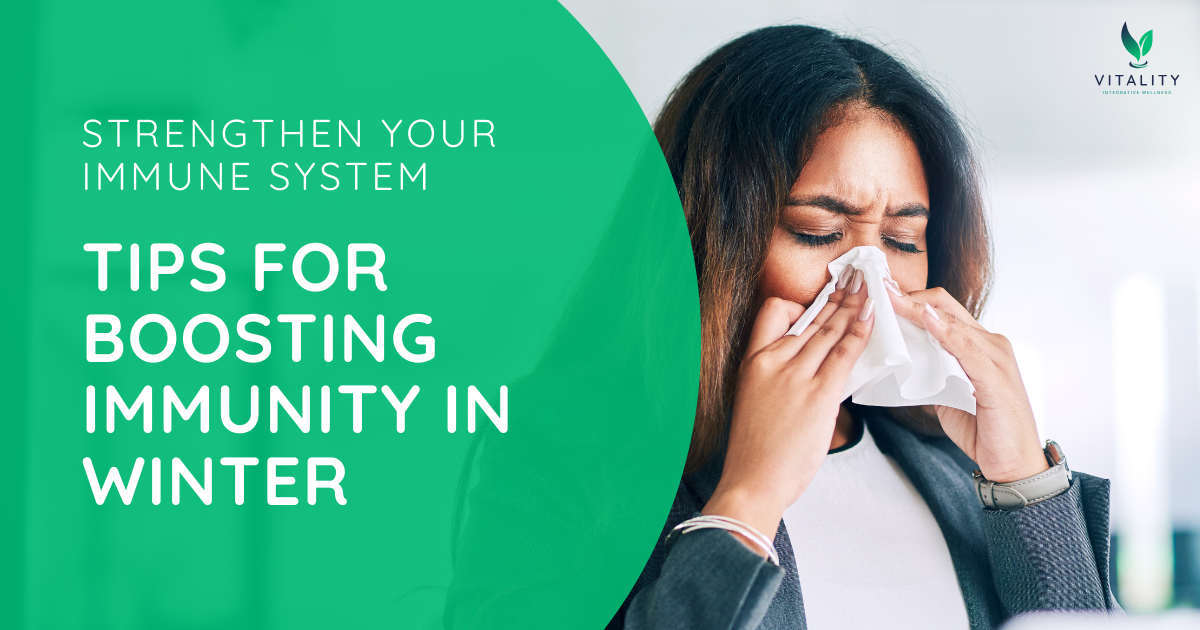
Understanding the Immune System and Its Role in Health
An individual with a healthy immune system encounters between 600 and 1,200 various kinds of potentially harmful bacteria every single day. For those whose immune systems are impaired or weakened, that number rises. Without a strong immune system, everyone would be sick all the time.
The immune system is our body's natural defense mechanism against infection. It's a complicated network of organs, cells, and proteins that work together to protect your cells. Functioning similarly to self-learning, defensive software in that by defeating germs, "your immune software" has now taught itself how to protect you from the next encounter. Supporting your immune system is a must for warding off colds and managing immunodeficiency diseases in the winter.
How Winter Affects Your Immune System
Winter, in particular, can be hard on your immune system. In general, viruses are active in colder weather. The chances of coming into contact with contaminated surfaces or environments are higher in winter. Then, as the temperature drops, your body will struggle more to fight off viruses and other illnesses that enter through the upper airways effectively. The cold air dries up your nose's barrier to germs, making it more vulnerable to an upper respiratory infection.
Diet Tips for Boosting Immunity in Winter
The most effective strategy to help strengthen immunity in the winter is undoubtedly through your food. What you eat supports the growth and maintenance of beneficial microbes and stimulates an immune response. Our diets are also a great way to get the vitamins our immune systems need to function properly. For example, vitamin D is necessary for the healthy functioning of your immune system. While most people opt to take a vitamin D supplement in the winter, your diet is another excellent source of this critical vitamin.
Foods rich in vitamin D include:
Fish
- Cod liver oil
- Salmon
- Swordfish
- Tuna
- Sardines
Fortified foods
- Fortified orange juice
- Fortified dairy, plant milks, and cereals
Other
- Beef liver
- Egg yolk
Other foods that boost your immunity are:
- Root vegetables and greens because of their beta-carotene content.
- Miso, yogurt, tofu, sauerkraut, and tempeh are rich in probiotics.
- Garlic, which acts as a natural T-cell booster.
On the contrary, some foods—such as sugar-filled beverages, processed carbs, and alcohol—will weaken your immune system.
Supplements to Strengthen Your Immune System
Most people can obtain all the vitamins and minerals needed for a healthy immune system just from their diet. However, there are occasions when taking specific supplements may help boost immunity. For example, since there is less daylight in the winter, it's normal for people to become deficient in vitamin D, an essential immune booster.
Some supplements to strengthen your immune system include:
- Vitamin D calms the inflammatory responses of white blood cells before they can cause damage. The supplement also helps bolster the production of germ-fighting proteins.
- Vitamin C can help support your immune system by protecting it from free radical damage. Taking vitamin C in the winter can also shorten the duration of a cold if you catch one.
- Beta-carotene both stimulates and increases the immune system's production.
- Probiotics promote gut health. And a healthy gut can support a strong immune system by maintaining immune homeostasis. Specifically, it aids in gut regulation when choosing to attack a harmful germ or your own cells.
- Selenium is an essential mineral that can only be obtained through diet or supplements. It strengthens the immune system by increasing white blood cell production.
- Zinc is an essential mineral that plays a central part in immune function. It plays an important role in the development and function of immune cells. Typically, we get our zinc content through poultry, red meat, nuts, and whole grains, but you can also take it as a supplement.
If you are looking for some great immune-boosting supplements to get you through the winter, Dr. Bell created a list of the immune support supplements he recommends in Full Script. You have to log in and create an account, but once inside, you’ll find Dr. Bell’s immune system supplement picks on the catalog page.
Lifestyle Changes for a Stronger Immune System
Suggestions for lifestyle changes that can boost immunity
Get more sleep
While getting enough shut-eye is important any time of year, improving sleep hygiene in the winter is especially beneficial for supporting immune health. The immune system releases proteins called cytokines when you sleep. When you are stressed out, have an infection, or are experiencing inflammation, your body is prompted to produce more cytokines to help you out. However, if you don't get enough rest you won't make the cytokines you need to keep your body protected.
Move more often
Exercise is linked to a better immune system. The extra movement alone can aid in clearing the lungs and airways of germs. Exercise has also been shown to increase the production of immunological proteins that fight disease and increase the circulation of cells that kill germs. However, the risk of infection increases in the 24 hours that follow high-impact exercise or prolonged gym sessions. Regular, moderate exercise should be enough to help boost your immune system throughout the winter.
Wash your hands
We should already be routinely washing our hands, but since more viruses are active in the cold, doing so more often throughout the winter is particularly crucial. Your risk of getting sick is significantly reduced if you wash your hands before touching your face or putting anything in your mouth.
Pick up a stress-relieving activity
Stress is the result of our bodies producing cortisol. The "stress hormone" triggers higher blood pressure and a faster heart rate. Short bursts of stress can trigger our immune systems and be beneficial. However, the prolonged production of cortisol can weaken your immune system. When too much cortisol is released, it suppresses the cytokines your immune system uses to fight infection and instead triggers a nonproductive inflammatory response. Being proactive about reducing stress during the colder months can also help boost immunity in winter.
Enhance your winter wellness journey with these resources:
- Age Gracefully with Functional Medicine - Learn how functional medicine supports long-term health.
- Dr. Bell's Recommended Immune Support Supplements - Access a curated list of supplements to strengthen your immune system.
- Understanding Bacteria and Your Immune System - An external resource on the role of bacteria in immune system health.


